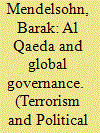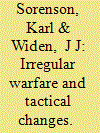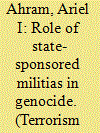|
|
|
Sort Order |
|
|
|
Items / Page
|
|
|
|
|
|
|
| Srl | Item |
| 1 |
ID:
132170


|
|
|
|
|
| Publication |
2014.
|
| Summary/Abstract |
In recent years, statements by al Qaeda leaders have included references to topics often associated with global-governance proponents' critique of the state. This article examines the organization's attitude toward symbols of global governance, giving particular attention to its view of the United Nations as the foundation for global governance, and to the manner in which al Qaeda approaches the central questions of environmental threats and human rights. The organization is seeking to insert itself into the discourse of global governance and use it in an instrumental manner; it focuses on anti-Western narrative and seeks to expose the existing order as designed by Western powers, particularly the United States, for self-serving reasons. However, the article argues, notwithstanding al Qaeda's reputation for sophistication in manipulating public opinion, the organization's references to global governance underscore the limitations its rigid ideology imposes on its messaging efforts. Even though adopting the global governance discourse is in line with the group's effort to improve its image, al Qaeda's extremist ideology limits its ability to take full advantage of the benefits this discourse offers.
|
|
|
|
|
|
|
|
|
|
|
|
|
|
|
|
| 2 |
ID:
132174


|
|
|
|
|
| Publication |
2014.
|
| Summary/Abstract |
The United States government has adopted new approaches to counter violent extremist organizations around the world. "Soft security" and development programs include focused educational training for groups vulnerable to terrorist recruitment, norm messaging through local radio programming, and job creation in rural communities. This article evaluates the effectiveness of one set of these multi-vectored, community-level programs through data from 200 respondents in two similar, neighboring towns in northern Mali, Africa. The data show that residents in Timbuktu who were exposed to the programming for up to five years displayed measurably altered civic behavior and listening patterns in comparison with their counterparts in the control town of Diré, which had no programming (controlling for potential covariates including age, ethnicity, and political and socioeconomic conditions). However, there was little measurable difference between the groups in terms of their cultural identities and attitudes towards the West. While this study is unable to definitively prove a causal connection between programming and behavioral outcomes, it nonetheless strongly suggests that the process of "winning hearts and minds" can be effective at certain levels but may require extended time and dedicated resources to generate higher-level results.
|
|
|
|
|
|
|
|
|
|
|
|
|
|
|
|
| 3 |
ID:
132166


|
|
|
|
|
| Publication |
2014.
|
| Summary/Abstract |
The aim of this article is to analyze the tactical behavior of Somali pirates, international naval forces, and the shipping community operating in the Gulf of Aden and the Somali Basin. To what extent has tactical behavior changed over time and can this process be understood in more theoretical terms? Our theoretical framework centers around some concepts often used in naval doctrine, discussing tactical change in terms of command and control, force, mobility, protection, intelligence, and endurance. We also evaluate this change using two tactical concepts-tactical adaptation and tactical development. The empirical data is based on statistics from the International Criminal Court-International Maritime Bureau and the EU NAVFOR Operation Atalanta, as well as interviews. We conclude that Somali piracy has unquestionably adapted their tactics to circumstances, while naval forces have increased their capacity to capture pirates and shipping to avoid pirates.
|
|
|
|
|
|
|
|
|
|
|
|
|
|
|
|
| 4 |
ID:
132173


|
|
|
|
|
| Publication |
2014.
|
| Summary/Abstract |
This study explores regime, power, and violence in international terror crises (ITCs). It examines terror strikes and retaliations against the terror groups and their hosts. The exploration tests two hypotheses: first, democracies, like other states, retaliate, even at the risk of escalation; and second, strong democracies fight back with massive violence as do authoritarian regimes. Historical narratives of ITCs from 1934 to 2006 show that strong democracies were the most common targets of terror. Like authoritarian states, they responded to terror, but were the most violent retaliators, followed by weaker states, democratic or not. So the democratic constraints affect weaker states more than stronger ones. These trends draw attention to the destabilizing nature of international terror and its challenge to the peaceful resolution of international disputes.
|
|
|
|
|
|
|
|
|
|
|
|
|
|
|
|
| 5 |
ID:
132172


|
|
|
|
|
| Publication |
2014.
|
| Summary/Abstract |
This article explains how and why armed, non-state actors collaborate with states to inflict massive levels of violence. Regime type and state capacity interact to provide state elites a menu of repertoires for implementing violence, some emphasizing direct state action, others emphasizing cooperation and alliance between state and armed, non-state actors. Rather than struggling in vain to build strong states to eliminate armed non-state actors and establish a monopoly over the use of force, averting genocide might necessitate recruiting and strengthening the power of indigenous, armed non-state actors.
|
|
|
|
|
|
|
|
|
|
|
|
|
|
|
|
| 6 |
ID:
132168


|
|
|
|
|
| Publication |
2014.
|
| Summary/Abstract |
The PKK, a violent group seeking secession in southeastern Turkey through the use of terror and guerilla methods, has evolved through different strategic and pragmatic phases in pursuing its goal. Ocalan, the incarcerated leader, classified the PKK's objectives into four deliberate strategic periods and commenced the final period of Strategic Lunge in March 2010 (for establishing de-facto autonomy). To compare these periods to PKK's real evolution, this article reviewed the entire process of the PKK (1973-2012) through analysis of resolutions from PKK congresses/conferences and the characteristics of PKK violence (e.g., target status, incident type/location, form, and purpose). This study argues that as opposed to Ocalan's assessment, PKK moves-particularly after 1994-are based on emergent (ex-post) pragmatic shifts rather than predetermined (ex-ante) strategic plans, as verified by analysis of the nature/form of PKK violence. It also argues that the PKK's pragmatic moves permeated even into its ideology and declared goal. Contrary to Ocalan's four-stage strategic periods, the PKK's initial manifesto indicates a three-stage Maoist strategy for reaching its goal. However, the PKK's military attempt to reach the third stage in 1991 failed due to conditions that were not sufficient for realization of the third stage of Maoist strategy. As a result, the PKK quit pursuing military victory after acknowledging its defeat in 1994; instead, since it still possessed the ability to initiate violence, it strategically employed (and ceased) violence to supplement its campaign of political compromise and negotiation.
|
|
|
|
|
|
|
|
|
|
|
|
|
|
|
|
| 7 |
ID:
132169


|
|
|
|
|
| Publication |
2014.
|
| Summary/Abstract |
A defining feature of Australian jihadism over the past decade has been the predominant involvement of individuals of Lebanese descent, along with Australian citizens engaging in jihadist activity in Lebanon. This article outlines the separate relevant cases of jihadist activity in Australia and Lebanon, and examines various explanations for this unique situation. It finds long-distance nationalism, target selection, and training locations to be inadequate explanations, despite their utility in other cases where ethnic diaspora associations converge with jihadist activity. The marginalisation and disadvantage faced by Lebanese-Australian Muslims proved to be an influence, but could not account for the difference between the small numbers involved in jihadism and the tens of thousands facing comparable social circumstances. The most direct explanation for this phenomenon proved to be the intimate personal connections between the radical networks straddling the two countries. A network analysis is therefore conducted, distinguishing between operational and social connections, in order to give greater insight into this threat.
|
|
|
|
|
|
|
|
|
|
|
|
|
|
|
|
|
|
|
|
|